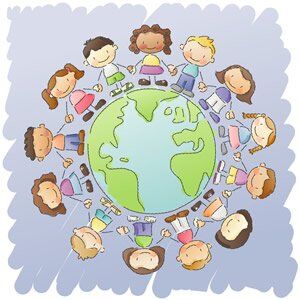by Stacey Schifferdecker
Thanksgiving is a uniquely American holiday, but the idea of an annual celebration to thank God for his bounty stretches back through time and around the world. Here are some ways other cultures celebrate Thanksgiving. Maybe you can find some ideas to enrich your own family’s Thanksgiving celebration this year.
The ancient Greeks, Romans, Hebrews, Chinese, and Egyptians all held harvest festivals and thanksgiving celebrations. These celebrations continue today in various forms. Jewish families celebrate with a seven-day autumn harvest festival called Sukkoth. Sukkoth commemorates how God cared for Moses and the Hebrew people as they wandered in the desert for 40 years before entering the Promised Land. During Sukkoth, families build small temporary huts out of branches and foliage. Inside the huts, they hang fruits and vegetables such as apples, grapes, corn, and pomegranates. A special ceremony is held each day to remember their Hebrew ancestors and to thank God for the harvest. Families eat in the hut at night and sometimes sleep there as well.
The Chinese harvest festival is called Chung Ch’ui or the August Moon Festival and is celebrated in mid-August. During this three-day celebration, Chinese families celebrate the end of the harvest season with a big feast featuring roasted pig and mooncakes. These palm-sized round cakes symbolize family unity and perfection, so the Chinese people also give mooncakes to their friends and relatives as a way of giving thanks. You can buy mooncakes at the nearest asian grocery store to you. Legend says that during wartime, the Chinese hid secret messages in mooncakes and were able to thwart their enemies.
Vietnamese families also celebrate an autumn festival in mid-August. Their festival is called Têt-Trung-Thu (tet-troong-thoo) or the Mid-Autumn Festival. It is also called the Children’s Festival and many activities are planned for children. According to Vietnamese folklore, parents worked so hard on the harvest, they left the children playing by themselves. To make up for it, parents would show their love and appreciation for their children at the Mid-Autumn festival. One popular activity is a candlelit lantern procession at dawn, often with lanterns the children make themselves. The lanterns represent brightness while the procession itself symbolizes success in school.
Ghana, Nigeria, and Korea also celebrate the harvest is August. Ghana and Nigeria have a Yam Festival because yams are the most common food in many African countries and are the first crop to be harvested. The Korean festival is called Chusok. Families get together and eat special rice cakes made of rice, beans, sesame seeds, and chestnuts. They also visit the tombs of their ancestors and dance traditional dances.
Southern India celebrates the harvest at a festival called Pongal in January of each year. Named after a sweet rice dish, Pongal features a community feast during which neighbors get together to share their crops and give thanks to everyone who contributed to a successful harvest.
Thanksgiving Day in Canada dates back to 1578, when explorer Martin Frobisher held a ceremony in Newfoundland to give thanks to God. This celebration is the most similar to the American Thanksgiving, even featuring many of the same foods and hymns. The similarities stem from the American Revolution, when many Americans who remained loyal to England moved to Canada, bringing their American customs with them. However, the harvest season is earlier in Canada, so they celebrate Thanksgiving in October instead of November. Canadians also celebrate on Monday rather than Thursday.
Other harvest festivals around the world include the German Erntedankfest celebrated in September each year and a Brazilian public day of thanksgiving and prayer celebrated on the fourth Thursday of November.
Comment from More4kids: While there is a lot of bad stuff happening around the world, we need to give pause and be thankful, for us, our kids and our family. From all of us here at More4kids, we wish everyone a safe and happy Thanksgiving.
Biography
Stacey Schifferdecker is the happy but harried mother of three school-aged children—two boys and a girl. She is also a freelance writer, a Children’s Minister, a PTA volunteer, and a Scout leader. Stacey has a Bachelor’s degree in Communications and French and a Master’s degree in English. She has written extensively about parenting and education as well as business, technology, travel, and hobbies.
No part of this article may be copied or reproduced in any form without the express permission of More4Kids Inc © 2011 All Rights Reserved












Thank You For Helping Me On My School Project 😀